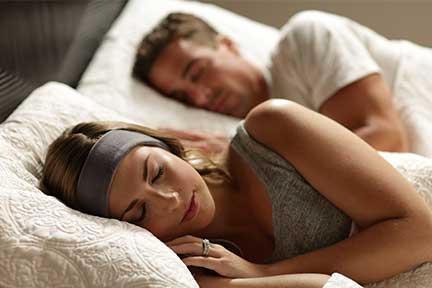Difficulty Sleeping Next to Someone? Read This!

Sleeping next to someone can have various benefits, such as increased relationship satisfaction, improved mood, and decreased stress. But, it's not always easy for everyone. Whether it's an issue with your partner's snoring or a problem specific to you, know that everyone has different sleeping needs, and yours may not align with your partner's.
So don't feel like you need to banish your better half to the couch or guest bedroom just yet. AcousticSheep, makers of SleepPhones®, is here to review a few of the most common issues when sleeping next to someone and how to resolve them.
1. Your Partner is too Hot
Your partner may be so darn good-looking that it makes it hard to sleep. But more than likely, even with those good looks, it's an issue of body temperature.
In general, people sleep better in a cooler environment. Research points to approximately 65 degrees Fahrenheit as being the ideal temperature. Alas, adding an extra 98.6-degree body into the mix doesn't exactly foster a cool environment. To resolve this issue, consider:
- Buying Cotton or Linen Sheets
- Buying a Bigger Bed
- Buying a Breathable Mattress Pad and Cooling Pillow
- Sleep with Fewer Clothes On
- Cool Your Room Down (open windows, use a fan, AC, etc.)
- Stay Well Hydrated
While many people like to cuddle, you may have to break away during the night to cool down. If your partner is feeling forlorn on the other side of the bed, be sure to communicate with them about why you need some space.
2. Your Partner Has a Sleep Disorder

Unfortunately, when it comes to sharing a bed, your partner's sleep disorder may impact you. Interestingly, it's not just their tossing and turning that'll keep you awake; you might even adopt some of their sleep patterns.
A recent Kiel University study found that partners may synchronize their sleep-wake cycles. This synchronization can be good for some couples. Kiel's research also suggests that the benefits for the sleep-disordered individual outweigh the detrimental effects for the healthy sleeper.
If your partner has a sleep disorder, it's important that you encourage them to see a doctor if they haven't already. Moreover, help them make lifestyle changes that could alleviate the symptoms of their condition. These changes may include:
- Going to Counseling
- Taking Prescribed Medications
- Exercising More
- Shutting of Electronics Before Bed
- Limiting Food, Alcohol, and Tobacco Before Bed
3. It's a Deviation from the Norm
If you've spent most of your time sleeping solo, then sharing a bed with your significant other is a huge change. Suddenly you have new interruptions, noises, and movements happening right next to you. If it's a new relationship, know that, for most people, it takes a little getting used to.
As your sleeping arrangements become more familiar, your sleep will likely improve. Your best bet is to communicate openly with your partner about your sleep concerns. If they've made other significant changes to your sleep environment, there may be ways to compromise (e.g., room temperature, electronics on/off, sleep schedules).
4. Your Sleep Schedules Are Mismatched
There are a few reasons why your bedtimes aren't lining up. First, your circadian rhythms may be off. These differences in your internal clocks may be genetically determined. However, some people are early birds while others are night owls.
If your partner is disrupting your sleep with light, noise, or movement, ask them to make small adjustments to their nighttime and/or morning behaviors. For instance, if they're watching television in the bedroom, ask that they move to the living room after a certain time. If they're being noisy while opening closets and dresser drawers, ask that they lay their clothes out the night before or put on their pajamas early.
5. You're Both on Your Phones Before Bed
Powering down your electronic devices before bed can make a significant difference in the quality of your sleep. For this reason, try minimizing laptop, tablet, smartphone, and television usage at least 30 minutes before bed.
The blue light that electronic devices emit may suppress your brain's production of melatonin, a hormone that helps regulate your circadian rhythm. But, it's not just the blue light that is to blame. If you're scrolling through social media before bed, you may be at higher risk of feeling depressed, anxious, and stressed. These changes in your mood may make it more difficult to sleep.
6. Your Partner Snores
Research from the Mayo Clinic suggests that if your partner is sawing logs all night, they can be responsible for up to 50 percent of your sleep disruptions. If you're sleeping with a snorer, consider minimizing or masking the sound with earplugs or headphones specifically designed for sleep, such as SleepPhones® headphones.
If you suspect your partner has undiagnosed sleep apnea, it's vital that they see a doctor. Sleep apnea is a common and potentially serious condition that causes abnormal breathing during sleep. It occurs when the upper airway becomes repeatedly blocked during sleep, reducing airflow.
If your partner's sleep apnea is severe enough, it may be necessary for them to wear a continuous positive airway pressure (CPAP) mask or dental appliance. Getting snoring, especially from sleep apnea, can have some incredible gains for your sleep. The Mayo Clinic found that the elimination of snoring resulted in an additional 62 minutes of sleep per night for spouses of snorers with sleep apnea.
Should We Sleep in Separate Rooms?
In modern culture, starting in the 1960s, attitudes around sleeping together instead of alone shifted radically. As personal an activity as sleep is, there is a lot of social pressure to make it a joint venture with our partner. Likewise, there is often a sense of shame and a stigma around sleeping apart. Yet, research indicates that people actually sleep objectively worse with a partner.
Despite these findings, most couples still prefer to sleep with their partners. However, it's critical that everyone prioritizes their own sleep for critical reasons. Not only does it foster better health and wellness, but consistently good sleep can also strengthen relationships.
If one or both partners' sleep is being disrupted continuously, sleeping in separate rooms may be a solution. Remember that every relationship is different. It's also important not to let buzzwords such as "sleep divorce" scare you away from exploring this approach.
That said, many couples can use critical problem-solving skills to work through the challenges of sleep together. Even with entirely different sleep schedules, research suggests that flexibility and adaptability led to:
- less conflict
- more communicating
- more time spent in shared activities
- more sexual intercourse
The Perks of Learning to Sleep Together
Again, everyone has different sleep needs and preferences. But, learning to sleep soundly with your partner can come with a variety of benefits.
A study conducted by the University of Hertfordshire found that "touching" while you sleep can increase relationship satisfaction. Ninety-four percent of couples who spent the night in contact with one another were happy with their relationship, compared to 68 percent of those who didn't touch.
Cuddling in bed can improve your mood by releasing "feel good" hormones such as oxytocin, dopamine, and serotonin. In turn, you may feel less stressed and anxious. Sticking it out under the same set of sheets may also result in additional benefits such as improved/increased sexual intercourse and a boosted immune system.
Sleep Together. Listen Apart.
Before banishing your partner to another bedroom, try making a few lifestyle changes. Moreover, try individualizing your sleep environment by investing in a pair of SleepPhones. These headphones are specifically designed for sleeping and are perfect for listening to your favorite sleep sounds and white noise.
Whether you're masking your partner's snoring, or one of you likes to sleep in silence while the other needs noise, SleepPhones can help. If you're interested in learning more about SleepPhones, please visit our website and browse our selection of sleep products.
